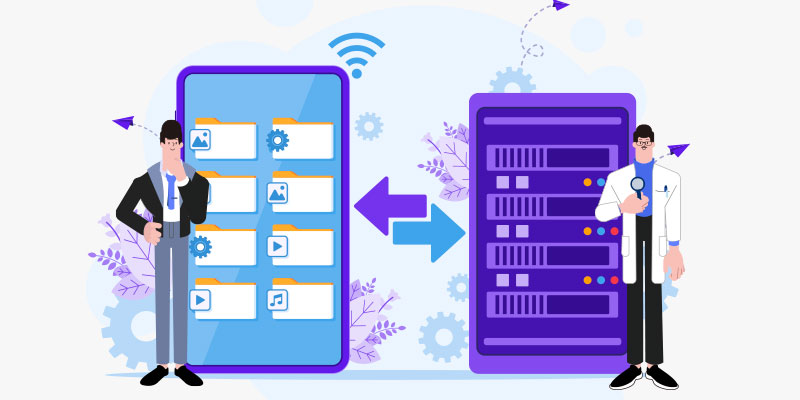Streamlined Data Protector Online Backup For Large Enterprises
Streamlined Data Protector Online Backup For Large Enterprises
Blog Article
High-speed Backup System For Data Center In the Cloud Era
Organizations must overcome the crucial challenge of protecting their priceless information as digital data storage becomes more and more important. By offering safe and accessible storage for important data, cloud database backup offers a solution. We will discuss the advantages and significance of cloud database backup in this article, as well as the best methods for putting it into practice and effectively managing it.
- Knowing how to backup a cloud database
High-performance Offsite Backup Server In a Nutshell
The act of storing copies of your database online in a remote server or data center is known as cloud database backup. It offers an off-site backup option that guarantees data redundancy, hardware fail-safeness, natural disaster defenses, and cyber threats. Backup Multiple Computers Online.
- Benefits of cloud database backup
Multi-layered Backup Solution For Personal Files Data Protection Strategies
Compared to conventional backup techniques, cloud database backup has a number of benefits. These comprise:

Data redundancy: By storing data across multiple servers, hardware failures and disasters are less likely to result in data loss.
Scalability: Depending on your needs, cloud backup makes it simple to scale up or down your storage requirements.
Accessibility: With cloud backup, any internet-connected device will allow you to access your data whenever, wherever you want.
Cost-effectiveness: Cloud backup does away with the need to spend money on expensive backup personnel, infrastructure, and maintenance.
Automated Backups: By automating scheduling and incremental backups, cloud backup services frequently eliminate the need for manual backup.
Advanced Remote Server Backup Software Trends
- Selecting a Cloud Database Backup Service:
Take into account the following when choosing a cloud database backup provider:
Cross-platform Backup Solution For Hard Drive Advantages
- Security Measures: Make sure the service provider uses strong security measures like compliance certifications, access controls, and encryption.
- Reliability: Look for businesses that have a solid reputation for dependability and long-term warranties.
- Scalability: Verify that the service provider provides storage options that are adaptable to your expanding data requirements.
- Data transfer speed: Take into account the provider's bandwidth and network infrastructure for quick and effective data transfers.

- Cloud database backup implementation:
Streamlined Online Backup Security Concerns Security Assessment
Use these best practices to implement cloud database backup successfully:
- Define Backup Policies: Clearly specify your backup requirements, including the frequency, retention, and recovery point goals.
- Encryption: To guarantee the integrity and confidentiality of your data, encrypt it before moving it to the cloud.
- Regular Testing: To ensure that your backups are accurate and complete, regularly test the restoration process.
Implement monitoring and alerting systems to quickly identify problems or failures in the backup process.
- Disaster Recovery Plan: Create a thorough disaster recovery plan that outlines how to retrieve data in the event of an emergency.
Safe Backup Solution For Storage Devices ROI Calculation

- Managing a backup cloud database
Continuous monitoring and maintenance are necessary for managing cloud database backup. Take into account the following advice:
Next-gen Cloud Backup Pros And Cons Cost Analysis
- Regularly Monitor Backups: Keep an eye on the backup procedure to make sure it's done correctly and quickly fix any mistakes or failures.
Update Backup Policies: To keep up with evolving business requirements and compliance requirements, periodically review and update your backup policies.
- Retention Management: Depending on business priorities and legal requirements, control how long your backups are kept.
Implement data look at here archiving techniques to transfer infrequently accessed data to cost-effective storage tiers while maintaining accessibility.
Periodic Reviews: Review your cloud database backup strategy on a regular basis to spot areas for improvement and make sure it aligns with company objectives.
Important Notes:
Safe Offsite Backups Data Case Studies
Data redundancy, scalability, accessibility, cost efficiency, and automated backups are just a few of the advantages of cloud database backup, which offers secure and accessible storage for important data.
- When selecting a provider, take security precautions into account, as well as dependability, speed of data transfers, and reliability.
Creating backup policies, encryption, regular testing, monitoring and alerting, and creating a disaster recovery plan are all steps in the implementation of cloud database backup.
Regular backup monitoring, backup policies updates, retention management, data archiving, and periodic reviews are all necessary to effectively manage cloud database backup.
Remember that protecting the sensitive data in your organization requires the implementation of a strong cloud database backup strategy. To ensure data security, accessibility, and business continuity, embrace cloud backup's power.
Offsite Cloud Backup Whitelabel In the Cloud Era
Key Takeaways or a related phrase:
Data redundancy and protection from hardware failures or disasters are guaranteed by cloud database backup.
Scalability, accessibility, cost effectiveness, and automated backups are some of the advantages.
When selecting a provider, take security precautions into account, as well as dependability, speed of data transfer, and scalability.
- Adopt best practices like disaster recovery planning, encryption, regular testing, monitoring, and alerting.
Monitoring backups, updating policies, managing retention, putting data archiving into place, and conducting periodic reviews are all parts of effective management.
Report this page